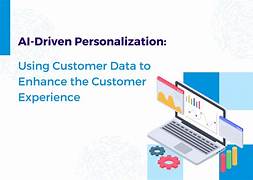The Role of AI in Enhancing Personalized Customer Experiences
In today’s fast-paced, consumer-driven world, personalization has become a crucial factor in customer satisfaction and loyalty. Businesses are constantly seeking ways to connect with their customers on a deeper, more individualized level. Artificial intelligence (AI) has emerged as a transformative tool in achieving this goal. By leveraging AI technologies, companies can analyze vast amounts of data, predict customer preferences, and deliver highly tailored experiences that were once unimaginable.
This article explores how AI is revolutionizing personalized customer experiences, the benefits it offers, and the challenges businesses face in its implementation.
The Need for Personalization
Modern consumers expect more than generic service; they want interactions that feel relevant and meaningful to them. Personalization is no longer a luxury—it’s a necessity. A personalized experience can:
- Enhance customer satisfaction by meeting individual preferences.
- Foster loyalty by showing customers they are valued.
- Drive sales through tailored recommendations and promotions.
However, delivering personalized experiences at scale can be daunting without the right tools. This is where AI comes into play.
How AI Drives Personalization
AI enables businesses to understand and cater to individual customer needs in real-time. Here’s how:
1. Data Analysis and Insights
AI can process vast amounts of data, including purchase histories, browsing behaviors, and demographic information, to uncover patterns and insights.
- Customer Segmentation: AI divides customers into micro-segments based on behavior, preferences, and needs.
- Predictive Analytics: By analyzing past actions, AI predicts future behaviors, enabling proactive engagement.
For example, an online retailer can use AI to analyze a shopper’s browsing history and recommend products they’re likely to purchase.
2. Personalized Recommendations
AI algorithms, such as those used by streaming platforms and e-commerce sites, deliver personalized recommendations tailored to individual tastes.
- Product Recommendations: Online stores like Amazon use AI to suggest products based on previous purchases or items viewed.
- Content Recommendations: Streaming platforms like Netflix and Spotify analyze viewing or listening habits to recommend shows, movies, or playlists.
These systems not only enhance user experience but also boost sales and engagement.
3. Chatbots and Virtual Assistants
AI-powered chatbots and virtual assistants provide personalized support by understanding and responding to customer queries in real-time.
- Customer Support: Chatbots can resolve common issues, recommend products, or guide users through a process.
- Voice Assistants: AI-driven tools like Alexa and Siri learn user preferences over time to provide more relevant responses.
These tools make interactions more efficient and convenient for customers.
4. Dynamic Pricing and Offers
AI enables businesses to implement dynamic pricing strategies and personalized offers based on customer behavior and market trends.
- Real-Time Adjustments: Airlines and hotel chains use AI to adjust prices based on demand, customer browsing patterns, and competitor pricing.
- Tailored Discounts: Retailers send personalized discounts or offers to customers based on their shopping habits.
This approach ensures customers feel valued while maximizing revenue.
5. Customer Journey Mapping
AI tracks and analyzes the customer journey across multiple touchpoints, providing insights into preferences and pain points.
- Behavior Tracking: AI monitors how customers interact with websites, apps, or physical stores.
- Feedback Analysis: Natural language processing (NLP) tools analyze customer reviews, surveys, and social media comments to gauge sentiment and identify areas for improvement.
These insights help businesses optimize the customer experience at every stage.
The Benefits of AI-Powered Personalization
The integration of AI into personalization strategies offers numerous benefits:
1. Increased Customer Satisfaction
By delivering relevant and timely experiences, AI enhances customer satisfaction, leading to better retention rates.
2. Higher Conversion Rates
Personalized recommendations and offers directly impact purchasing decisions, boosting conversion rates and revenue.
3. Improved Efficiency
AI automates complex tasks like data analysis and customer segmentation, freeing up human resources for strategic decision-making.
4. Scalability
AI enables businesses to deliver personalized experiences to millions of customers simultaneously, something that would be impossible through manual processes.
Challenges in Implementing AI for Personalization
Despite its potential, the use of AI in enhancing customer experiences is not without challenges:
1. Data Privacy and Security
The reliance on customer data raises concerns about privacy and security:
- Regulatory Compliance: Businesses must comply with data protection laws like GDPR or CCPA.
- Trust Issues: Misuse of data can erode customer trust, affecting brand reputation.
Clear policies and robust cybersecurity measures are essential to address these concerns.
2. Algorithm Bias
AI systems can unintentionally reinforce biases present in the data they are trained on, leading to unfair or inaccurate recommendations.
- Diverse Datasets: Ensuring training data represents a wide range of demographics can help mitigate bias.
- Ongoing Monitoring: Regular evaluation and updates to algorithms are necessary to maintain fairness.
3. Integration Challenges
Integrating AI solutions with existing systems can be complex and costly, especially for small and medium-sized businesses.
- Technical Expertise: Implementing AI requires skilled professionals and significant resources.
- Legacy Systems: Older systems may lack compatibility with AI technologies.
Investing in scalable, user-friendly AI solutions can help businesses overcome these hurdles.
4. Customer Acceptance
Not all customers are comfortable with the level of personalization AI offers:
- Perceived Intrusion: Overly personalized interactions may feel invasive to some users.
- Transparency: Customers expect to understand how their data is being used.
Balancing personalization with transparency and consent is key to addressing these concerns.
The Future of AI in Personalization
As AI technologies continue to evolve, their role in personalization will only grow. Here are some emerging trends:
1. Hyper-Personalization
AI will move beyond generic segmentation to offer truly individualized experiences based on real-time data.
2. Emotion Recognition
AI systems will analyze facial expressions, tone of voice, or text sentiment to gauge customer emotions and adapt interactions accordingly.
3. Augmented Reality (AR) and Virtual Reality (VR)
AI will enhance AR and VR experiences, offering personalized virtual shopping, gaming, or training environments.
4. Proactive Personalization
AI will anticipate customer needs and deliver solutions before they even ask, creating a seamless and intuitive experience.
Conclusion
AI is revolutionizing how businesses approach personalized customer experiences, offering unprecedented opportunities to connect with consumers on a deeper level. From tailored recommendations to dynamic pricing, AI-powered personalization enhances satisfaction, loyalty, and profitability.
However, to fully realize its potential, businesses must address challenges related to privacy, bias, and integration. By adopting ethical practices, fostering transparency, and embracing innovation, companies can harness the power of AI to create meaningful and memorable customer interactions.
The future of personalized experiences lies in the hands of AI—and businesses that invest in its capabilities today will shape the customer landscapes of tomorrow.


